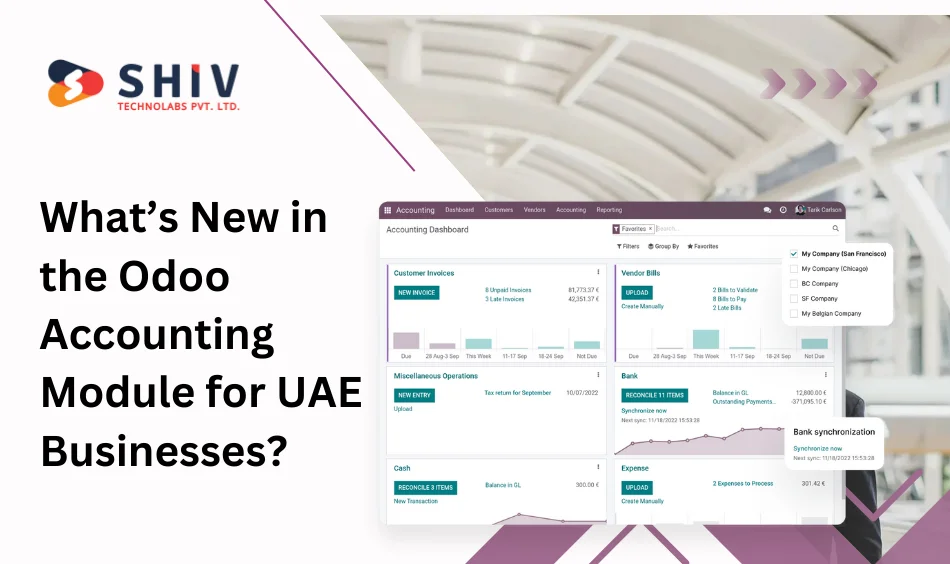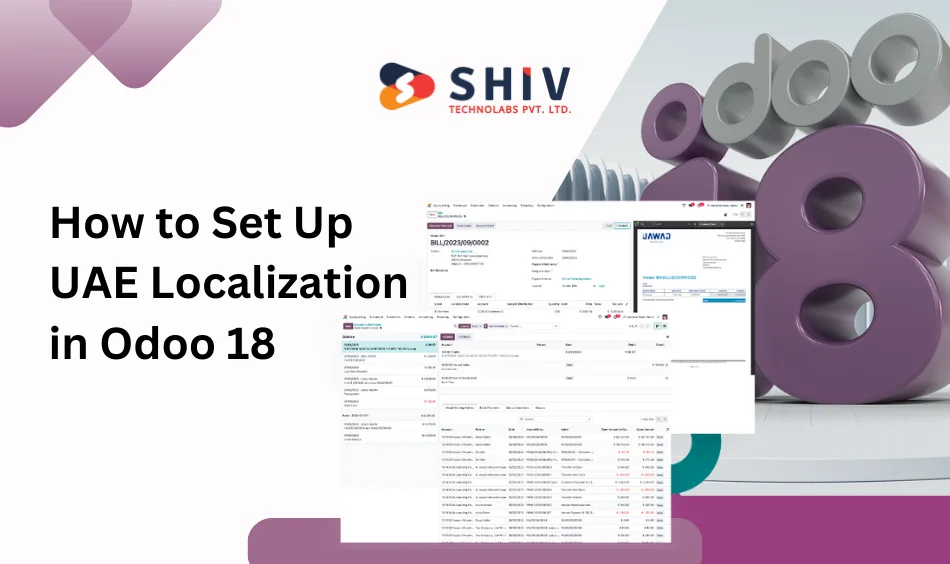Table of Contents
Businesses in the UAE face a unique set of accounting and tax obligations. With the introduction of corporate tax and the ongoing enforcement of VAT, many companies now require tools that match legal expectations. Odoo UAE has taken major steps to support these needs through localized features and updates. Odoo Localization UAE focuses on building systems that work in line with local requirements, offering modules that suit companies of all sizes.
This article covers new additions and improvements in Odoo localization, especially those aligned with the UAE’s Federal Tax Authority (FTA). It also breaks down how the platform simplifies accounting, VAT filing, and corporate tax compliance.
Why UAE Localization in Odoo 18 Matters for Modern Businesses
Localization is no longer optional for companies operating in the UAE. With strict guidelines from the Federal Tax Authority (FTA), businesses must follow specific rules for VAT, corporate tax, payroll, and reporting. Generic accounting software often fails to meet these regional expectations.
Odoo 18 addresses these gaps through a set of localized tools made for the UAE market. These features cover tax setup, reporting formats, payroll compliance, and bilingual document generation. From preloaded chart of accounts to real-time dashboards and WPS file support, the updates reflect actual business needs in the country.
By offering built-in support for UAE corporate tax, VAT configuration, multi-currency handling, and Arabic invoicing, Odoo 18 gives companies a way to stay compliant without relying on external tools. This version helps create a consistent, legally aligned system that works out of the box for UAE-based operations.
Also Read: Why Choose Odoo ERP for Your UAE Business?
What’s New in the Odoo Accounting Module for UAE Businesses?

Odoo 18 brings a focused set of tools built around UAE tax laws and accounting standards. From VAT-ready invoicing to corporate tax tracking, the platform helps businesses meet local compliance needs without relying on external add-ons.
1. Predefined Chart of Accounts (UAE Standard)
Odoo 18 includes a ready-to-use chart of accounts based on UAE accounting norms. Businesses no longer need to build account structures from scratch. The system groups accounts by function—like income, expenses, and liabilities—and includes ledgers specific to VAT payables, receivables, and corporate tax provisions.
2. Built-in VAT Support for UAE
The VAT engine in Odoo handles all the UAE-specific requirements:
- Auto-assigns VAT rates to products and services
- Differentiates between standard, zero-rated, and exempt categories
- Links VAT entries to sales and purchase transactions
- Generates VAT return reports aligned with FTA formats
This built-in Odoo VAT configuration for UAE helps avoid filing errors and reduces the need for external calculations.
3. Corporate Tax Management Tools
With the introduction of corporate tax in the UAE, Odoo 18 brings tools that let businesses track taxable income, apply exemptions, and prepare reports for the FTA:
- Tags for taxable and exempt revenue
- Fields for tax relief adjustments
- Monthly and annual tax liability summaries
- Data formatted for UAE corporate tax compliance in Odoo
These updates make it easier to stay on top of tax submissions without manual workarounds.
4. Real-Time Financial Reporting
The Odoo accounting module provides live dashboards showing:
- VAT payable balances
- Net profit and taxable income
- Cash flow forecasts
- Journal entries linked to audit files
This type of real-time financial reporting helps decision-makers act faster and stay prepared for audits.
5. Multi-Currency Accounting
Odoo handles foreign currencies with full transparency. Businesses can:
- Invoice clients in USD, EUR, or any global currency
- Record currency exchange gains or losses
- See conversions reflected in AED for all tax filings
- Apply exchange rates automatically or manually
Multi-currency support helps UAE companies manage cross-border sales without separate tools or conversions.
6. Arabic Language Support in Invoices
The platform supports bilingual document generation. Users can:
- Create invoices in Arabic and English
- Send FTA-compliant PDFs with both languages
- Format all accounting documents to suit regional expectations
This feature is critical in the UAE, where many government portals and clients prefer Arabic.
These features simplify how businesses manage accounting, especially for those operating across borders. With multi-currency support, it becomes possible to run real-time calculations and keep track of both AED and foreign income.
Also Read: A Complete Cost Guide for Successful Odoo Implementation in UAE
How to Set Up UAE Localization in Odoo 18: Step-by-Step Installation Guide

Installing the UAE localization package in Odoo 18 is the first step toward meeting local accounting and tax requirements. The package activates country-specific features like VAT configuration, corporate tax setup, Arabic support, and a ready-to-use chart of accounts. Below is a step-by-step process to help you get started:
Step 1: Access Odoo Apps Module
Log in to your Odoo backend using admin credentials. From the main dashboard, go to the Apps module. This section allows you to install new features and activate additional modules.
Step 2: Search for the UAE Localization Module
In the search bar, type: “United Arab Emirates – Accounting” or simply “UAE”. Look for the official module that supports UAE localization. It may be listed as “United Arab Emirates – Accounting (UAE)”, developed by Odoo S.A.
Step 3: Click Install
Once you find the module, click the Install button. The system will automatically load:
- UAE-compliant chart of accounts
- Standard VAT settings
- Fiscal positions for domestic and international clients
- Legal and tax codes pre-approved by the UAE FTA
Step 4: Confirm Activation
After installation, go to Accounting > Configuration > Settings to confirm that the UAE localization settings are active. You should see fields for VAT, currency formats (AED), and country-specific options enabled.
Step 5: Configure Company Details
Still under the Accounting Settings, make sure your company profile is accurate. Include:
- Registered name
- TRN (Tax Registration Number)
- Legal address in the UAE
- The default currency is set to AED
This information will automatically populate tax invoices and VAT reports.
Step 6: Check VAT and Fiscal Positions
Navigate to Accounting > Configuration > Taxes to review VAT rates that were added during installation. The module typically includes:
- 5% Standard VAT
- 0% VAT for eligible goods and services
- Exempt categories
Under Fiscal Positions, you’ll find mappings to auto-apply tax rules based on customer location or product type.
Step 7: Test Setup with Sample Transactions
Before going live, create a few test sales and purchase invoices. Make sure:
- VAT is calculated correctly
- The right chart of accounts is applied
- Entries reflect in the general ledger
- Reports include the correct tax values
Step 8: Set Up User Access Rights (Optional but Recommended)
Go to Settings > Users & Companies > Users, and define access levels for your accounting team. Assign roles like “Accountant” or “Advisor” so that sensitive tax settings are not changed by mistake.
By following these steps, your Odoo instance will be fully prepared to support accounting processes aligned with UAE standards. The UAE localization module in Odoo 18 simplifies what would otherwise require extensive manual setup or third-party apps.
Also Read: ERP Implementation Cost Breakdown – 2025 Guide for SMEs
Future of Odoo Localization in UAE
As the UAE’s financial and regulatory landscape continues to evolve, Odoo is expected to expand its localization efforts to match new compliance demands and business workflows. The updates introduced in Odoo 18 reflect a shift toward stronger regional support, and future versions are likely to build on that momentum.
Here’s what businesses in the UAE can expect moving forward:
1. Deeper Corporate Tax Integration
With the corporate tax UAE now active, Odoo is expected to refine its reporting tools further. Future versions may include templates for direct FTA submissions, pre-built tax return forms, and automatic corporate tax reconciliation with profit and loss statements.
2. E-Invoicing and Real-Time Audit Features
More emphasis is expected on digital invoicing standards. Odoo may introduce structured data formats (e.g., XML or UBL) to meet future audit file requirements. Real-time syncing with government portals could become standard.
3. AI-Supported Reporting
To reduce manual tasks, Odoo may introduce AI-assisted tax categorization, data validation, and real-time error checks for VAT and corporate tax reports. These tools could help finance teams avoid penalties due to human error.
4. Stronger Payroll Compliance Tools
Odoo could expand its payroll tools to include more built-in reports for WPS, end-of-service tracking, and cross-checks for labor law compliance, especially as rules around leave, gratuity, and allowances continue to grow more detailed.
5. Improved Arabic Language Experience
Bilingual usability remains key in the UAE. Future updates may include advanced right-to-left (RTL) formatting across all modules and better Arabic translations in settings, reports, and accounting fields.
Odoo’s direction supports growing business needs in the UAE. With each release, the platform is becoming more aligned with government mandates and industry expectations, making it a strong choice for local businesses that want to remain compliant, accurate, and future-ready.
Also Read: The Strategic Advantages of Implementing Accounting Software
Why UAE Companies Prefer Shiv Technolabs for Odoo ERP Development
Implementing Odoo for accounting and tax compliance in the UAE requires a local-first approach. Preloaded features in Odoo 18 help with VAT, corporate tax, payroll, and Arabic document support—but many businesses still need system adjustments to match their exact workflows. That’s where Shiv Technolabs steps in.
We provide affordable Odoo ERP development and customization services for UAE businesses. Whether you’re a retail brand, service provider, or distributor, our team helps configure your Odoo instance with:
- UAE-specific chart of accounts
- Real-time financial dashboards
- Corporate tax and VAT setup
- WPS-compliant payroll systems
- Arabic-English invoicing
- Custom workflows built for your operations
Our focus is on precision, clarity, and compliance, without overcomplicating the process. Whether you’re starting from scratch or upgrading to UAE Localization in Odoo 18, we offer the support and technical depth to make your system tax-ready and future-focused.
Final Thoughts
Odoo has built a reliable framework for UAE businesses dealing with today’s tax and payroll regulations. From Odoo VAT configuration to UAE corporate tax compliance in Odoo, the platform brings together key tools in one system, helping teams stay compliant without adding unnecessary complexity.
For companies that need to meet FTA requirements, manage multi-currency transactions, and issue bilingual financial documents, Odoo 18 offers the right foundation.
To get the most out of this setup, it’s important to work with a team that understands both the platform and the UAE’s business environment. Shiv Technolabs helps businesses tailor their ERP setup to local requirements—whether that means adjusting workflows, configuring tax modules, or building custom reports.
With the updates in Odoo Localization UAE, and the right technical support, businesses in the region can build systems that are ready for today, and built to handle tomorrow. Contact our Odoo experts now!






















